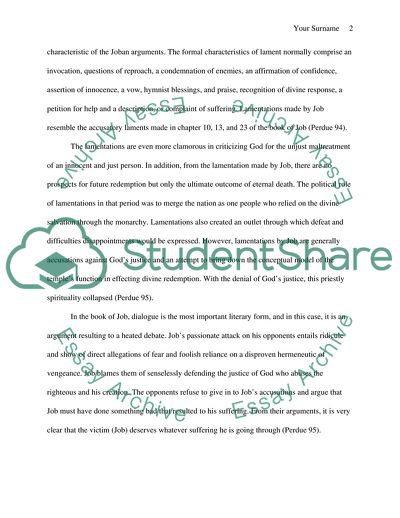Cite this document
(The Literary Forms in the Book of Job and Ecclesiastes Essay Example | Topics and Well Written Essays - 1750 words, n.d.)
The Literary Forms in the Book of Job and Ecclesiastes Essay Example | Topics and Well Written Essays - 1750 words. https://studentshare.org/religion-and-theology/1771825-the-literary-forms-in-book-of-job-and-ecclesiasties-how-they-help-to-bring-out-the-message-get-in-the-details-because-there-are-many
The Literary Forms in the Book of Job and Ecclesiastes Essay Example | Topics and Well Written Essays - 1750 words. https://studentshare.org/religion-and-theology/1771825-the-literary-forms-in-book-of-job-and-ecclesiasties-how-they-help-to-bring-out-the-message-get-in-the-details-because-there-are-many
(The Literary Forms in the Book of Job and Ecclesiastes Essay Example | Topics and Well Written Essays - 1750 Words)
The Literary Forms in the Book of Job and Ecclesiastes Essay Example | Topics and Well Written Essays - 1750 Words. https://studentshare.org/religion-and-theology/1771825-the-literary-forms-in-book-of-job-and-ecclesiasties-how-they-help-to-bring-out-the-message-get-in-the-details-because-there-are-many.
The Literary Forms in the Book of Job and Ecclesiastes Essay Example | Topics and Well Written Essays - 1750 Words. https://studentshare.org/religion-and-theology/1771825-the-literary-forms-in-book-of-job-and-ecclesiasties-how-they-help-to-bring-out-the-message-get-in-the-details-because-there-are-many.
“The Literary Forms in the Book of Job and Ecclesiastes Essay Example | Topics and Well Written Essays - 1750 Words”. https://studentshare.org/religion-and-theology/1771825-the-literary-forms-in-book-of-job-and-ecclesiasties-how-they-help-to-bring-out-the-message-get-in-the-details-because-there-are-many.


